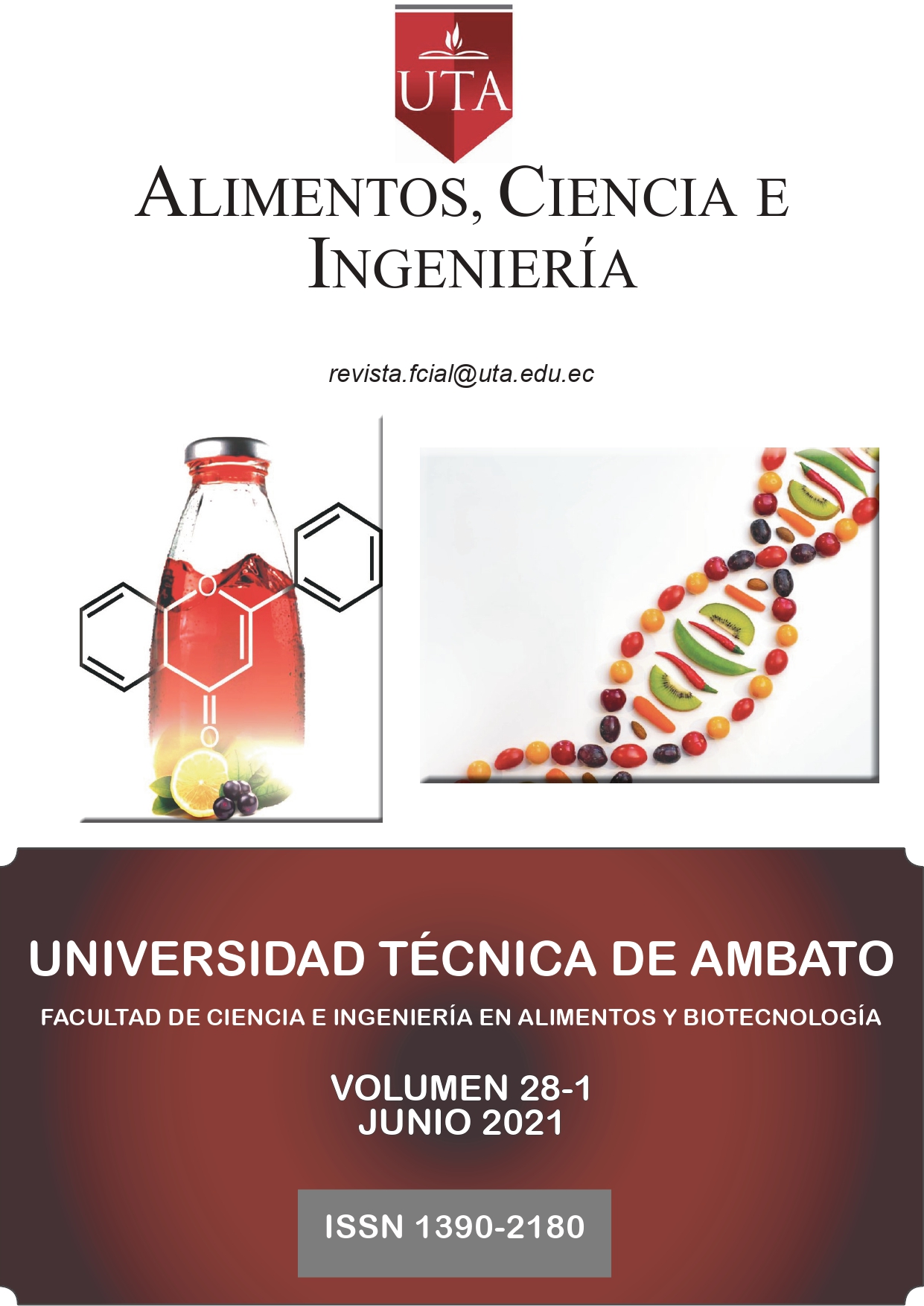Formulation and physicochemical and sensory characterization of an Andean Carchense flavored semi-mature cheese
Main Article Content
Abstract
In this project, a semi-ripe flavored Andean from Carchi – Ecuador type cheese was formulated and characterized in a physicochemical, sensory and microbiological way, using Pizán milk as raw material, genetically developed in the province of Carchi. An experiment was carried out in triplicate under a design completely randomized where two phases were developed, the first referring to the contextualization of the cheese evaluating raw material from two breeds of cattle, type of microorganisms and the final draining temperature, the best treatment was obtained through a sensory analysis, corresponding to a cheese made with milk from the Pizán race, lactic culture L. delbrueckii and L. helveticus, draining temperature of 44ºC and matured for 28 days, with this treatment the second phase was elaborated in which the addition of sauces and the coating to the crust, where the treatment made with milk from the Pizán race presented greater acceptability zán and lactic culture L. delbrueckii and L. helveticus, a dewatering temperature of 44ºC, flavored with pesto, matured for 28 days and with a coating of dehydrated species. Through sensory evaluation, the three best treatments were determined, these were subjected to an analysis of fat, protein and humidity, resulting in 39%, 10.5% and 51% respectively, percentages that are within the range established in the Ecuadorian Technical Regulations. NTE INEN 2607. In the microbiological analysis the absence of Enterobacteriaceae and Staphyloccocus aureus was determined, denoting that the product is completely harmless. Through these statements it can be concluded that the Pizán race milk meets the physicochemical parameters required for the production of ripened semi-hard cheeses, the milk of this breed is rich in macronutrients such as fat and proteins that provide unique texture, flavor and performance. typical of an Andean cheese.
Downloads
Article Details

This work is licensed under a Creative Commons Attribution-NonCommercial 4.0 International License.
Aquellos autores/as que tengan publicaciones con esta revista, aceptan los términos siguientes:
a. Los autores/as conservarán sus derechos de copiar y redistribuir el material, bajo los términos estipulados en la Licencia de reconocimiento, no comercial que permite a terceros compartir la obra bajo las siguientes condiciones:
Atribución: debe dar el crédito apropiado, proporcionar un enlace a la licencia e indicar si se realizaron cambios. Puede hacerlo de cualquier manera razonable, pero no de ninguna manera que sugiera que el licenciante lo respalda a usted o su uso.
No comercial: no puede utilizar el material con fines comerciales.
Sin restricciones adicionales: no puede aplicar términos legales ni medidas tecnológicas que restrinjan legalmente a otros hacer cualquier cosa que la licencia permita.
References
El comercio. (2019). El sector agropecuario se recupera en Carchi. Recuperado el 8 de junio del 2019 de https://www.elcomercio.com/actualidad/sector-agropecuario-carchi-leche-comercio.html
El telégrafo. (2017). Los controles sanitarios determinan la calidad de los lácteos en Carchi Recuperado el 8 de marzo del 2019 de https://www.eltelegrafo.com.ec/noticias/regional/1/los-controles-sanitarios-determinan-la-calidad-de-los-lacteos-en-carchi.
INEN. (2008). INSTITUTO ECUATORIANO PARA LA NORMALIZACIÓN, NORMA TÉCNICA ECUATORIANA NTE INEN 0009 REQUISITOS PARA LECHE CRUDA.
INEN. (2012). INSTITUTO ECUATORIANO PARA LA NORMALIZACIÓN, NORMA TÉCNICA ECUATORIANA NTE INEN 2604 REQUISITOS PARA QUESOS MADURADOS.
INEN. (2012). INSTITUTO ECUATORIANO PARA LA NORMALIZACIÓN, NORMA TÉCNICA ECUATORIANA NTE INEN 2607 REQUISITOS PARA QUESO ANDINO MADURADO.
Iza Narváez, M. F. (2017). Desarrollo de un queso semiduro con hierbas aromáticas para la granja experimental UDLA. Tesis de grado publicada, Universidad de las Américas, Quito, Ecuador.
Paredes, C. (2018). Caracterización sensorial y perfil de textura del queso amasado de la provincia del Carchi. Tesis de maestría publicada, Universidad de las Américas, Quito, Ecuador.
La Hora. (2016). Carchi produce 20 mil quesos diarios. Recuperado el 18 de mayo del 2019 de https://lahora.com.ec/noticia/1101987114/carchi-produce-20-mil-quesos-diarios-
López, N. C., & Novoa, C. F. (2009). Efecto de dos niveles de grasa sobre la vida útil sensorial del queso campesino. Revista de la Facultad de Medicina Veterinaria y de Zootecnia, 56(1), 32-40.
Moreno, A. (2019). Estudio de una línea de elaboración de queso mozzarella ecológico a partir de leche de búfala y de vaca. Tesis de grado publicada, Universidad Politécnica de Madrid. Madrid España.
SENPLADES. (2010). Agenda Zonal para el Buen Vivir. Zona 1. Quito: Imprenta Monsalve Moreno.


